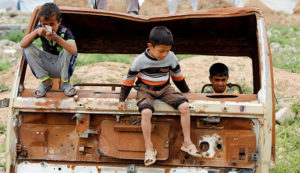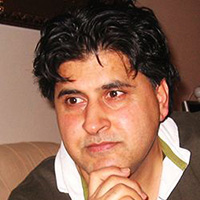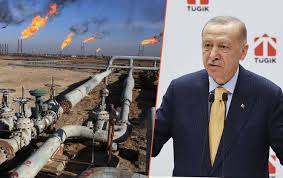
BAGHDAD — On June 27, the US Department of State’s Human Trafficking Report for 2017 took Iraq off its list, after the country had been listed in 2016 for recruiting children into combat.
The move raises questions about what Iraq could have done to get Washington to take this positive position for Baghdad, despite Human Rights Watch‘s having said in a report issued Aug. 30, 2016, that tribal militias backed by the Iraqi government recruit children to fight the Islamic State (IS).
On June 5, press reports accused “some militias of opening centers in the Sunni provinces to train children and adolescents on how to use weapons.”
These charges also included the Kurdistan Region in the country’s north. The executive director of the children’s rights division at Human Rights Watch, Zama Neff, said Jan. 6, “Human Rights Watch documented 29 cases of child recruitment in which armed groups linked to the PKK [Kurdistan Workers Party] had recruited children in Sinjar and in the Kurdistan Region of Iraq — even though the group’s commanders had pledged to end the practice.”
On June 12, the Euro-Mediterranean Human Rights Monitor reported, “The Kurdish Peshmerga and the PKK party also recruit children, targeting both Kurdish and Yazidi families and force them to fight and man security checkpoints. Such child recruitment is a war crime and contravenes UN Security Council resolutions 1612 (2005) and 1882 (2009). It also is a criminal act according to the domestic laws of Iraq.”
International law prohibits the recruitment of children under the age of 15 as soldiers. This is also defined as a war crime by the International Criminal Court.
The Iraqi War Crimes Documentation Center considered Iraq to be in violation of this law in its June 17 report, which also noted the Popular Mobilization Units (PMU) were training children to carry weapons.
The most prominent manifestations of child recruitment were when the Islamic Supreme Council of Iraq, one of the largest political blocs in the country, whose armed factions were fighting IS, trained children on how to use weapons in the city of Najaf in central Iraq on June 29. Critics compared these children to Ashbal Saddam (Saddam’s Lion Cubs) who fought for Saddam Hussein’s regime, which was was overthrown by the US invasion in 2003, while others compared them to the “Lion Cubs of the Caliphate,” fighting for IS.
All this prompted Human Rights Watch to demand June 29 that US Secretary of State Rex Tillerson put Iraq back on the US list of countries accused of recruiting children. However, the leader of the Islamic Supreme Council, Sadruddin Qabbanji, does not see why Iraq should be accused of such charges. On May 29, he told the media, “The training sessions in Najaf are defensive physical activities, not armed training.”
PMU leader Rayan al-Kaldani told Al-Monitor, “Children who were trained on how to use arms never participated in battles because the PMU leadership rejects this and considers it a violation of children’s rights.”
He said, “The PMU has enough fighters and doesn’t need to recruit children. One of the reasons why Iraq was dropped from the US list is because it was able to put an end to individual cases that occurred in 2014 after IS invaded Iraqi cities and young men and women rushed to volunteer in the ranks of security forces. As soon as the security leaders discovered this, they prevented everyone under the age of 19 from volunteering to fight IS.”
Kaldani added, “The PMU has become a military structure like the rest of the military branches in the ministries of interior and defense, which has prevented spontaneous and uncoordinated volunteering. Washington is well-aware that children are not participating in the battles of the Iraqi army and the PMU, and that’s why Iraq has been removed from the list of countries that recruit children in war.”
Habib al-Torfi, a member of the parliamentary commission on human rights, told Al-Monitor, “Iraq would not have been taken down from the list of countries that recruit children for war if it had not already overcome this phenomenon that is harmful to children.”
He said, “The PMU factions and the security forces have recently taken measures to prevent any patriotism-motivated attempt to involve children in the war. Iraq is a member of the Convention on the Rights of the Child and the parliamentary Commission on Family and Children is keen on monitoring any violations that may occur.”
Torfi said, “Iraq was included in the 2016 list after tribes and armed groups sought to recruit even children to defend themselves against IS, which was recruiting children in areas it controlled to carry out suicide bombings and participate in battles.”
Legal expert Tarek Harb told Al-Monitor, “Iraq was put on that list mainly for political reasons; there were no actual facts supporting the Iraqi state’s [alleged] recruitment of children.”
He added, “Washington kept a close eye on Iraq last year and found that no child participated in the battles against IS. The Iraqi government punishes any armed faction that does not abide by the law of military service and the Internal Security Forces law, which prevent the involvement of those under the legal age of 18 years from joining the security service.”
Harb said that “only a few armed groups formed by tribes or parties were training children on how to use weapons but never allowed them to participate in battles.”
Dropping the charges of child recruitment will restore the international community’s trust in Iraq and the country will gain support in its war on terrorism. It also creates an Iraqi generation that believes in peace, not violence, which gives it opportunities for quality education.
(*)Adnan Abu Zeed is an Iraqi author and journalist. He holds a degree in engineering technology from Iraq and a degree in media techniques from the Netherlands.

Translator Cynthia Milan
Source: Al-Monitor, July 9, 2017
http://www.al-monitor.com/pulse/originals/2017/07/children-recruiting-iraq-war-us.html#ixzz4mXoDfR00
Download PDF: US drops Iraq from list of countries that recruit children for war. By Adnan Abu Zeed








Comment here